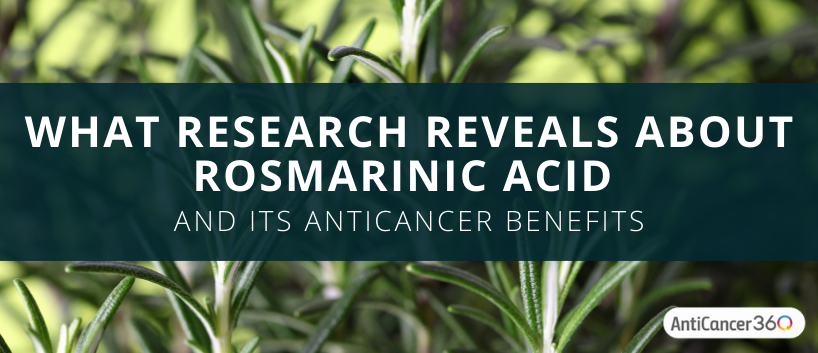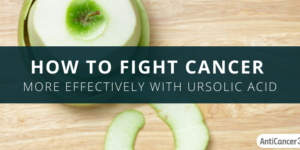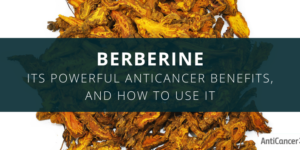If you do any cooking, you have probably heard of rosemary. Rosemary is a common household spice, found in grocery stores worldwide, and is used to season various dishes, such as soups, casseroles, salads, and poultry. You may not know that rosemary has potential anticancer benefits.
When you are fighting late-stage and challenging cancer, it is essential to support your body in every way possible. Depending on your situation, rosmarinic acid may help you fight cancer from every angle, in addition to your oncologist treatments.
What is Rosmarinic Acid?
Rosmarinic acid is a substance found in various plants such as rosemary, lemon balm, and mint. Rosemary is one of the most common kitchen herbs and is used as a cooking spice. The evergreen rosemary shrub, Rosmarinus officinalis L., is a member of the Lamiaceae mint family and is native to the Mediterranean region [1],[2].
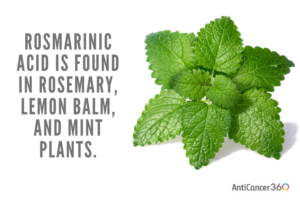
Rosemary has been used for centuries in traditional medicine for its healing properties. In the middle ages, rosemary essential oil was distilled for medicinal purposes. Today, rosemary still has many uses and proposed health benefits.
Rosemary essential oil is used as a fragrance in soaps and perfumes and as aromatherapy for stress relief. Rosemary-containing skin products claim to help restore hair growth, and mouthwash products are thought to help support healthy gums. As an oral supplement, products containing rosmarinic acid are used to support memory, mood, joints, digestion, and kidney health, among other uses [1].
In addition to these traditional uses, rosmarinic acid has received increased attention over the last few years for its potential role in helping to prevent and fight cancer. Studies suggest that rosmarinic acid has antioxidant effects [1].
Next, we will take a closer look at the possible anticancer effects of rosmarinic acid. In most cases, the scientific evidence is limited to studies in animals or laboratory Petri dishes. There is not as much funding available to conduct expensive human clinical trials with herbal substances compared to the pharmaceutical industry’s drug development.
Just because a natural substance has limited clinical studies in humans, but has demonstrated anticancer benefits with low risks of side effects, does that mean you should not use them? Why not fight cancer from every possible angle, especially with difficult or advanced cancers?
Our approach advises taking advantage of the time in between your cycles of the oncologist’s treatments. Time is the #1 most precious resource when you are fighting advanced or terminal cancer. Also, some natural supplements may help reduce side effects and improve the success of oncology treatments. We can guide you on the appropriate use of natural substances with potential anticancer benefits to support your body, even during the “off-treatment” times.
Cancer Metabolism Suppression: How to Starve Cancer with Rosmarinic Acid
Cancer metabolism is the process by which cancer turns nutrients into energy. Starving cancer with drugs and natural supplements is crucial in fighting cancer in every direction.
We aim to prevent sugar, fats, and proteins from nourishing cancer cells. This strategy weakens cancer cells to make them more vulnerable to treatments. Fortunately, rosmarinic acid is one of many natural substances that show potential in blocking cancer metabolism.
Rosmarinic Acid May Block Cancer Metabolism of Glucose
Cancer cells have different metabolic needs than that of healthy tissues. Most cancer cells have an altered metabolism that allows them to break down sugar (glucose) to make energy, even with limited resources and low oxygen levels.
Tumor cells typically require significant glucose metabolism to fuel their high-demand energy needs. Glucose is the primary source of energy for many types of cancers.
GLUT1 is a protein that transports glucose from the blood into cells. In many forms of cancer, tumor cells tend to grow more GLUT1 transporters on their surface than normal, healthy cells. This is known as the upregulation of GLUT1. Therefore, GLUT1 is a significant target in cancer treatment.
In a laboratory study of human liver cancer cells, scientists observed that rosmarinic acid caused cell death (apoptosis) by possibly blocking glycolysis. Glycolysis is a process that converts glucose into chemical energy (ATP) and lactate. The study results suggested that rosmarinic acid could downregulate GLUT1, which disables the cancer cell from converting glucose to ATP [3].
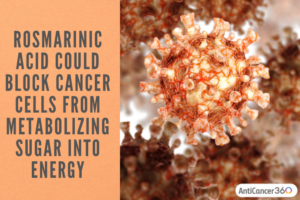
It is interesting to observe that rosmarinic acid reduces the transport of glucose from the blood into cancer cells. However, in non-cancer cells, rosmarinic acid appears to increase glucose uptake and improve insulin sensitivity. So depending on the type of cell, rosmarinic acid seems to exhibit anticancer or antidiabetic activity [3].
Rosmarinic Acid Reprograms Cancer Metabolism of Fats
Besides its ability to block steps of cancer cells’ sugar and protein metabolism, rosmarinic acid is also recognized for its effects on the metabolism of fats (lipids and cholesterol).
Menopause brings about some uncomfortable symptoms (hot flashes) and changes to a woman’s body due to a drop in estrogen levels. This estrogen deficiency has been linked to metabolic disorders, such as insulin resistance and high cholesterol. Unfortunately, these metabolic changes can lead to diabetes and heart attacks.
Postmenopausal women seem to have higher blood levels of oxidative damage than premenopausal women. The reduction in estrogen levels in postmenopausal women is likely associated with increased oxidative stress [4].
Prescription estrogen replacement therapies have fallen out of favor. While they effectively reduce uncomfortable menopause symptoms, they are linked to blood clots, stroke, coronary heart disease, and breast cancer [4]. A great deal of recent research has been focused on finding safer alternatives to estrogen replacement therapies. Due to oxidative stress involvement in metabolic disorders, substances with antioxidant activity (like rosmarinic acid) may be beneficial.
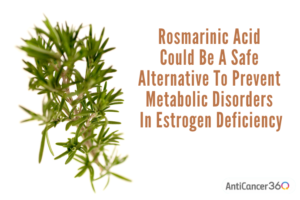
An interesting study was conducted to observe the effects of rosmarinic acid on estrogen-deficient female rats in 2019. One week after undergoing surgical removal of their ovaries (the primary source of estrogen), scientists gave the rats low dose or high dose oral rosmarinic acid. The lower dose used in this study corresponds to the amount of rosmarinic acid consumed by humans in the diet (spices, herbal teas). The larger dose was five times higher and reflected a human rosmarinic acid supplement. After four weeks, the researchers compared the rats to two controls group of rats that were not fed rosmarinic acid, one of which had their ovaries removed and one group that did not [4].
Both low-dose and high-dose rosmarinic acid resulted in decreased insulin resistance markers and reduced levels of oxidation in the estrogen-deficient rats. High-dose rosmarinic acid also caused a significant decrease in total cholesterol and triglycerides (types of fats in the blood). The results suggest that rosmarinic acid may be helpful in the prevention of metabolic diseases post-menopause.
Aggressive Integrative Approach with Rosmarinic Acid
Some research suggests that rosmarinic acid may help enhance the effects of chemotherapy.
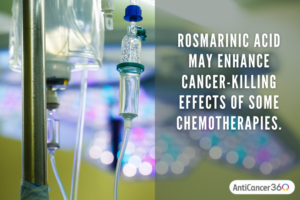
A study was performed to examine the combined effects of cisplatin, a chemotherapy drug, with rosmarinic acid on human renal cancer cells. The researchers demonstrated the anti-inflammatory and antioxidant effects of rosmarinic acid and its synergistic effects with cisplatin [5].
Researchers have recently developed a drug delivery method called Rososomes, a liposome constructed using rosmarinic acid [6]. A liposome is a spherical “bubble” or vesicle having at least one lipid (fat) bilayer membrane, and it contains drug or nutrient molecules. It is designed to improve the absorption of the product it holds.
In this study, Rososomes contained rosmarinic acid and doxorubicin, a chemotherapy drug. These researchers demonstrated that the iron cross-linked Rososomes had superior anticancer effects against breast cancer in mice, compared to free rosmarinic acid, doxorubicin, and liposomal doxorubicin (Doxil) [6].
How To Use Rosmarinic Acid: Dosages, Side Effects, and Precautions
Dosage
The usual recommended oral dosage is 200 mg to 500 mg of rosmarinic acid daily without food [1],[7].
In a clinical study, taking rosmarinic acid with food delayed the absorption and increased rosmarinic acid levels [8].
Side Effects
Rosmarinic acid is well-tolerated and has no significant side effects.
In a study of a single dose of 500 mg rosmarinic acid in 11 healthy individuals, no side effects were reported [8].
Interactions with Drugs and Supplements
Rosmarinic acid has some known drug interactions. Many unknown potential interactions can happen with rosmarinic acid, especially with chemotherapy and other supplements or medicines. This is not a comprehensive list of possible interactions.
- Aspirin/Salicylates. Rosemary extract contains aspirin-like components known as salicylates and may increase the risk of bleeding or bruising with other salicylate-containing medicines [1].
- Medications metabolized by certain kidney enzymes. Many active components of herbal products, such as rosmarinic acid, are organic anions. Rosmarinic acid might compete with drugs to be transported by kidney enzymes known as human organic anion transporters (OATs) [9].
This interaction can lead to alterations in the effects and side effects of certain medicines. Several medications interact with OAT types 1-3, including some blood pressure medicines, cholesterol medicines, antibiotics, antivirals, and chemotherapy drugs [10].
If you currently take medications, then you must consult with your doctor or pharmacist before including rosmarinic acid in your program.
Ultimately, you can see that there can be many potential benefits to adding a natural dietary supplement like rosmarinic acid to your overall anticancer program.
When using the “Aggressive Integrative Approach” to cancer, the goal is to fight cancer from every possible angle. This approach includes integrating natural supplements to fight cancer based on available evidence, despite limited human data, and to do it in a way that won’t interfere with your oncology treatments.
Please discuss the risk-versus-benefit potential with your healthcare professional before starting any natural supplement, including rosmarinic acid.
Are You A Candidate For Our Program?
If you’d like to learn more about the AntiCancer360 approach and see if we can help you… please watch our free online webinar to learn more about our approach. Then at the end, you’ll be able to schedule a free call with someone from our team so that we can discuss your case in more detail.
Citations
Dr. Patricia Weiser is one of AntiCancer360’s consultant pharmacists, science advisors, and medical writers. Her expertise helps us create safe herbal and supplement combinations and avoid potential drug interactions.
Patricia is a graduate of the University of Pittsburgh and a licensed pharmacist. She has clinical experience in both community and hospital pharmacy. She is passionate about integrative and preventative care and strives to empower her patients to take an active role in their health.

